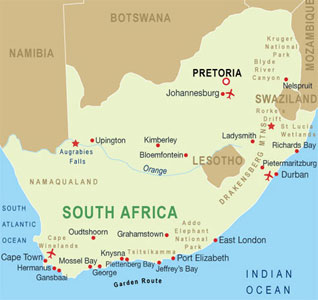About South Africa
Introduction
Since its first post-apartheid all-party elections in 1994, South Africa has developed a firmly entrenched democracy, a free press, and a sound economy.
South Africa is the economic and political powerhouse of southern Africa and plays a leading role in Africa’s regional and international agendas, including through the African Union, the New Partnership for African Development and the Southern African Development Community. In 1994, following the end of the apartheid era, South Africa resumed its seat in the UN General Assembly, rejoined the Commonwealth, and became an active and leading member of the Non-Aligned Movement. South Africa began a two-year term as a non-permanent member of the United Nations Security Council in January 2007.
South Africa has been important in supporting resolutions to conflicts in Africa, including in Burundi and the
Democratic Republic of Congo, and more recently in facilitating dialogue in Zimbabwe between the ruling ZANU-PF party and the main opposition party, the Movement for Democratic Change.
Facts about South Africa
- Capital city: Admin Capital Pretoria. Legislative Capital Cape Town
- Area: 1220088 square km
- National day: 27 April (Freedom day, anniversary of the first non-racial elections, 1994)
- Independence: 31 May 1910, union of four British colonies which evolved to full independence. Became the Republic of South Africa in 1961 and withdrew from the Commonwealth.
- Population: Approx 49 million
- Language: Afrikaans, English, Ndebele, North Sotho, Sesotho, Swazi, Tsonga, Tswana, Venda, Xhosa, Zulu. (eleven official)
- Currency: Rand ZAR (R)




